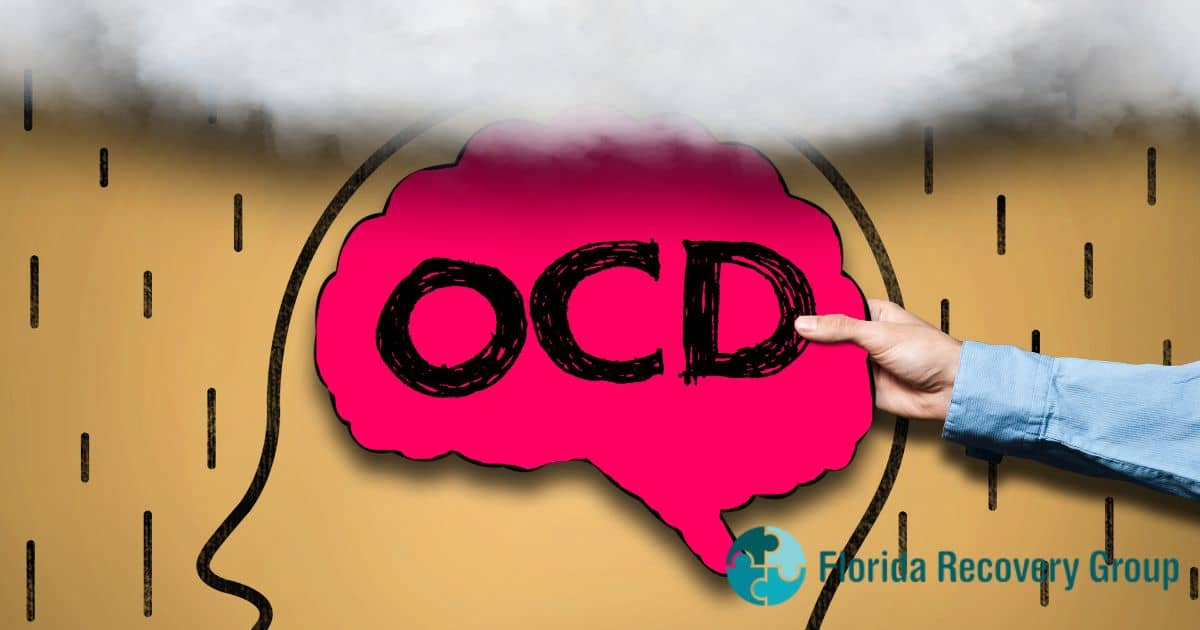
16 Dec What is Obsessive Compulsive Disorder (OCD) and How is it Treated?
Obsessive-compulsive disorder (OCD) is a mental health condition characterized by recurring and unwanted thoughts (obsessions). People get rid of these thoughts by engaging in compulsions, which are repetitive behaviors like hand washing, checking on things, or counting. The obsessions and compulsions that people deal with when they have OCD can significantly interact with their ability to complete activities and engage in social interactions.
According to the Anxiety and Depression Association of America, “OCD affects 2.5 million adults or 1.2% of the U.S. population.”[1]
If you or a loved one suffers from obsessive-compulsive disorder, professional behavioral and mental health treatment can provide you with the tools you need to regain control of your life.
Common Obsessions in People With Obsessive-Compulsive Disorder (OCD)
Obsessions are thoughts, images, or impulses that an individual experiences repeatedly. The obsessions they deal with are out of their control, often making the person feel disturbed or unsettled. Typically, obsessions are accompanied by intense and uncomfortable feelings such as fear, disgust, uncertainty, or doubt.
There are tons of different obsessions that people with OCD struggle with.[2]
Contamination obsessions:
- Fear of coming in contact with bodily fluids
- Germs/disease
- Environmental contaminants
- Household chemicals
- Dirt
Violent obsessions:
- Fear of acting on impulse to harm oneself
- Fear of acting on impulse to harm another
- Fear of violent or horrific images in one’s mind
Responsibility obsessions:
- Fear of being responsible for something terrible happening (e.g. fire, car accident)
- Fear of harming others due to not being careful enough (e.g. leaving the stove on and starting a fire)
Perfectionism-related obsessions:
- Obsessive concern about evenness or exactness
- Fear of losing or forgetting information when throwing something out
- Excessive concern with completing tasks correctly
- Excessive concern with remembering
- Fear of making mistakes
Sexual obsessions:
- Unwanted thoughts or mental images related to sex
- Fear of acting on a sex-related impulse
- Fear about sexually harming relatives, children, etc
- Fear about aggressive sexual behaviors toward others
Religious or moral obsessions:
- Excessive concern with offending God, damnation, or blasphemy
- Excessive concern with right and wrong or morality
These obsessions cause a great deal of stress on the individual experiencing them. Because of how stressful they are, people engage in compulsive behavior to stop the thoughts or images from occurring.
Common Compulsions in People with Obsessive-Compulsive Disorder (OCD)
Compulsions are repetitive actions individuals take to neutralize, counteract, or make their obsessions go away. While people with OCD realize that their compulsions are temporary solutions, they continue to engage in them because they don’t have other coping mechanisms. Oftentimes, compulsions are time-consuming and tortuous acts that the individual would rather not be doing.
Like obsessions, there are many different compulsions that people with OCD may engage in.
Washing or cleaning:
- Washing hands excessively or in a particular way
- Excessive showering, grooming, or toilet routines
- Cleaning household items or other objects excessively
- Doing other things to prevent or remove contact with contaminants
Checking:
- Checking that you didn’t and won’t hurt others
- Checking that you didn’t and won’t hurt yourself
- Checking to make sure nothing terrible happened
- Checking parts of your body or physical condition
Repeating:
- Rereading or rewriting
- Repeating routine activities (going in and out the doors, getting up and down from chairs)
- Repeating body movements (tapping, touching, or blinking)
- Repeating activities in multiples because a specific number is “good” or “safe”
Mental compulsions:
- Mental review of events to prevent harm
- Praying to prevent harm
- Counting while performing tasks to end on a “good” or “safe” number
- Canceling or undoing (replacing a “bad” word with a “good” one to cancel it out)
While compulsions are often intended to reduce the emotional stress caused by obsessions, some of these repetitive actions are harmful. For example, severe cases of OCD can cause people to compulsively wash their hands or body until their skin is raw or bleeding. Because compulsions can become so harmful to the person suffering, counseling and medications are often necessary.
How is Obsessive Compulsive Disorder (OCD) Treated?
If you or a loved one are thinking about entering a mental health treatment program for your OCD, knowing what to expect can ease some of your fears. Obsessive-compulsive disorder treatment involves a combination of behavioral therapy and medication.
Behavioral therapy is intended to help you overcome your obsessions and learn how to manage uncomfortable feelings without engaging in compulsions. A type of cognitive behavioral therapy (CBT) known as exposure and response prevention (ERP) is often used in the treatment of obsessive-compulsive disorder.
In addition to therapy, medications may be used to limit feelings of anxiety, and depression, and even prevent obsessions and compulsions from occurring frequently. The most common type of medication for OCD is a selective serotonin reuptake inhibitor (SSRI). These medications are non-habit forming and can be used short or long-term depending on your needs.
Find Treatment for Obsessive-Compulsive Disorder (OCD) Today
If you or a loved one suffer from the symptoms of obsessive-compulsive disorder, attending a mental health treatment program can help you regain control of your life. Living with this untreated can lead to immense amounts of stress and even self-harming behaviors, but mental health rehab programs like Florida Recovery Group can provide you with the support and tools you need to recover.
To learn more about our treatment programs in Delray Beach, FL, contact Florida Recovery Group today.
References:





